Anxiety is a beast that affects millions of people all over the world – upwards of 300 million, according to recent World Health Organization statistics. It’s common among people of all ages and genders, and its root causes vary wildly. Some people are naturally anxious, while others develop anxiety as a result of a life event. No matter the cause, some habits can actually aggravate those anxious feelings and make an already bad emotion feel far worse.
Why are some habits so incredibly destructive? Many are such a part of your daily routine that you may not even realize they’re having a detrimental effect on your mental health and sense of wellbeing. Habits are habits, after all, because they help you feel in greater control of your life. Habits are your choices, and you feel like you’ve got something right when you abide by them. It’s often besides the point that it may not be “good” for you or do anything particularly helpful for you.
Even though some of these habits might stimulate the brain’s reward center at first, that doesn’t necessarily mean that they’re good for you. Some of the worst habits of all, like drinking excessive amounts of caffeine and scrolling through social media, can really take their toll over time. Here are 10 unexpected habits that might be to blame for your increased anxiety.
If you or someone you know needs help with mental health, please contact the Crisis Text Line by texting HOME to 741741, call the National Alliance on Mental Illness helpline at 1-800-950-NAMI (6264), or visit the National Institute of Mental Health website.
Choosing to skip your meals (even occasionally)

What’s one missed meal, right? You’re in a rush, so there’s no time to sit down to a full meal. Or you grab a handful of nuts before you head out the door, completely omitting every other food group in the process. While the occasional quick bite in lieu of a proper meal might be okay, skipping meals as a matter of routine can be detrimental to your mental health. Not only does it mean you’re missing out on vital vitamins and nutrients that you need to thrive and stay strong, but it can also cause a hit to your mental health.
Specifically, neglecting to eat for extended periods causes your blood sugar to nosedive. This stimulates your body to increase its production of cortisol (the “stress hormone”). While it goes into overdrive in an effort to regulate your blood sugar levels, it also generates an unwelcome stress response that leads to symptoms like moodiness and general irritation.
It’s helpful to pay attention to your body’s hunger cues, and to actually listen to them. “Overlooking these to follow an externally focused eating schedule can lead to losing touch with these cues in a major way over time. Losing a grasp on what hungry and full feel like for you can lead to negative health consequences — and they can be difficult to regain,” explains Jessica Ball, M.S., RD, to Eating Well.
The fine art of aging
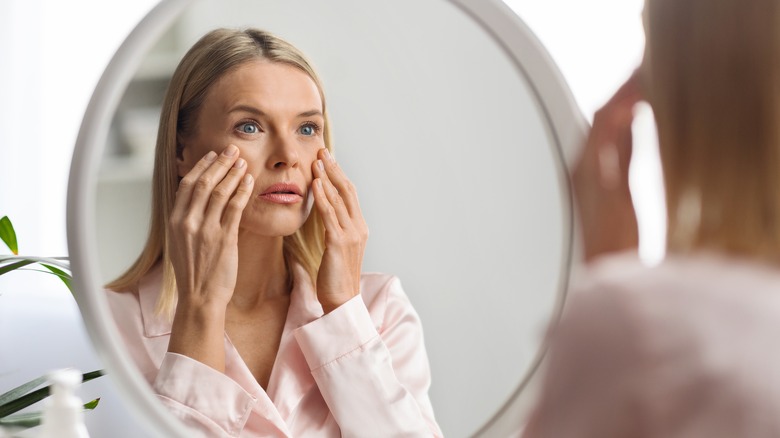
The simple truth is that with the privilege of age comes a possible increase in anxiety. “This is important because mental health problems in older adults are often overlooked and untreated because they usually co-occur with other problems. This may lead to severe consequences for their quality of life and overall health,” says Yinan Zheng, PhD, assistant professor of Preventive Medicine in the Division of Cancer Epidemiology and Prevention at Northwestern University.
While the precise cause of age-related anxiety can’t be specifically determined, studies attribute it to a variety of factors that affect people as they grow older. Issues such as chronic pain and disease, loss of friends and family, career transitions, and difficulty moving the way they once would can all have an impact on mental health.
The good news is that there are steps you can take to minimize your risk and better manage your emotional health as you age. Speaking to your doctor is a good starting point, as it gets the conversation going and may give your provider some insight into your current mental state. You might then benefit from therapy or medication. You may also want to try adopting solid habits that will benefit you both now and later in life, like getting regular exercise, drinking more water, and eating plenty of fruits and vegetables.
Eating too many yummy carbs
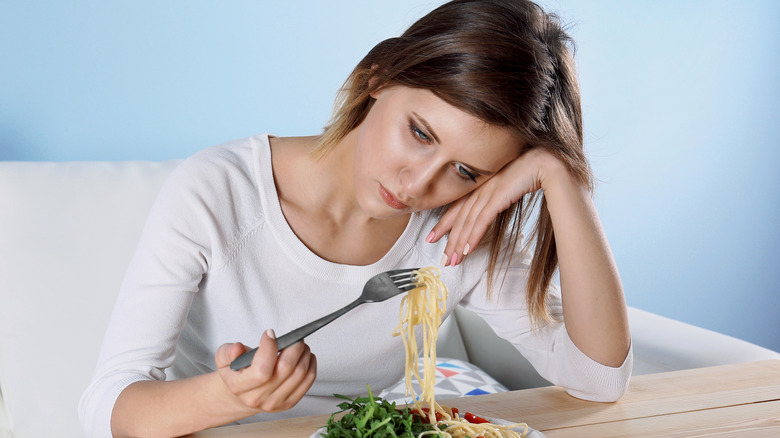
Africa Studio/Shutterstock
It’s not exactly a surprise that people love their cakes, cookies, and bread. No one can blame you for finding them absolutely irresistible, especially when there are so many opportunities to indulge in these delicious treats year-round. Yet there’s a downside to those oh-so-good carbs that make holidays, birthdays, and lunches with friends so special — and that isn’t all that great if you’re trying to stay calm or if you’re an anxious person who’s always looking for ways to dial back those jittery feelings.
As it happens, refined carbs, including refined sugars and refined grains, can impact your brain chemistry significantly. The bottom line is that they taste good but aren’t great for you otherwise. In fact, a 2024 study published in the European Journal of Nutrition identified a link between the consumption of refined grains and incidences of anxiety among women.
The science behind it is relatively straightforward. These types of carbs deliver a quick energy boost courtesy of glucose, which behaves like fuel for your body. Your brain gets what it needs — but only temporarily, as the steep, sudden influx of glucose declines just as swiftly and sharply as it came, leading to the dreaded “sugar crash.” That crash affects your brain, leaving you potentially irritable and moody.
Using technology too often
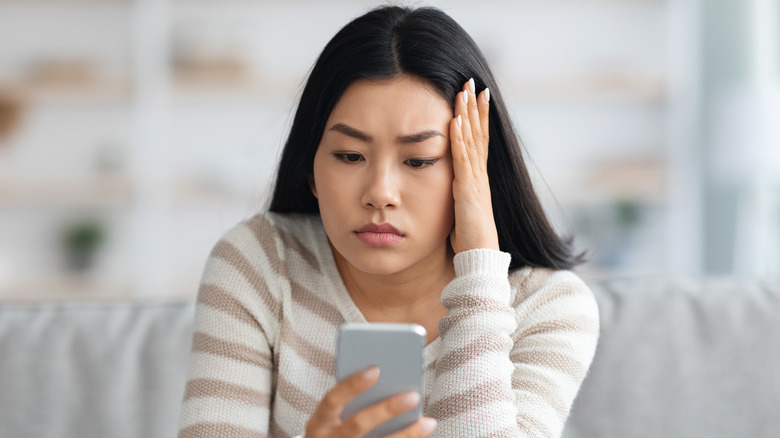
Prostock Studio/Shutterstock
Does this sound familiar? Wake up, hit snooze, fumble for your phone minutes later, scroll through, bleary-eyed, checking out your various social media accounts. Or spend every waking moment refreshing your email, or checking your texts, or doing something that involves your phone in any way, shape, or form.
Welcome to being a human being in the 21st century. While it’s certainly true that technology has changed the world, those changes haven’t all been positive. In fact, some people experience considerable anxiety because of technology. No matter what your activity of choice is, it could be a source of anxiety. Whether you’re “doom scrolling” or using social media, you might find that you feel worse using the internet. Part of this may be precisely because of technology’s many advancements — and the fact that it never seems to slow down.
“If we’re in this mode of constant change, social anxiety increases,” explains Greg Hall, a professor at Bentley University. He offers several explanations for the uptick in emotional distress, one of which is “skewed reality.” When people observe others’ lives through the lens of social media, it can have a naturally detrimental impact. Comparison is the thief of joy, after all, and the internet is filled with people whose lives are altered to reflect something far glossier than reality.
Not getting enough quality sleep
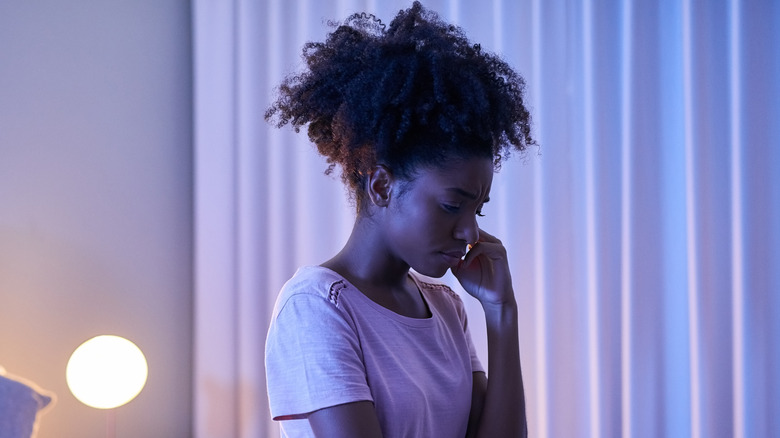
Adene Sanchez/Getty Images
Sure, not getting enough shut-eye can make you feel generally miserable and cranky, but it may also be responsible for your anxiety. It’s a nasty cycle, as the anxiety itself may be to blame for your lack of sleep. This probably doesn’t come as a huge surprise, as facing the day with minimal sleep can make you feel lethargic. You’re also less likely to focus clearly, and your reaction time may slow.
While the occasional sleepless night may not have a huge and lasting effect, studies have found a significant link between insomnia and mental health conditions like PTSD, OCD, and GAD. Unfortunately, the less that you can sleep, the more that you worry about it. Dr. Sarah Chellappa, a neuroscientist at the University of Cologne, explained to The New York Times, “Sleep loss is often a precursor for anxiety disorders, and anxiety leads to sleep loss.”
So, what’s the solution? Doctors offer a variety of remedies, including cutting caffeine out of your diet, writing down your worries, and establishing a calming nighttime routine. All of these can help you relax. Dr. Rafael Panayo, a clinical professor at Stanford University, told The New York Times, “If you lie in bed thinking, I hate my job, I hate my commute, then of course you’re not going to sleep well.” He recommends finding something you can look forward to in the mornings, whether it’s a cup of your favorite coffee or a podcast to kickstart your day.
Neglecting to get regular exercise

Delmaine Donson/Getty Images
Some people chalk up inactivity to sheer laziness. Others just aren’t motivated enough. Part of it could be intentional — maybe you just really hate working out — and another could be by design, as you’re so exhausted by your everyday life and busy routine that you can’t carve out the time to hit the gym.
Whatever the reason, that lack of movement could lead to an increase in anxiety. The good news is that you aren’t limited to a black-or-white solution. Going to the gym for an hour doesn’t have to be the only solution if you don’t have the time. In fact, researchers have found that going for even a quick 10-minute walk may be just as effective as engaging in a 45-minute exercise session (per the Anxiety & Depression Association of America). Some even suggest that exercise is as effective at relieving symptoms of anxiety in some individuals as taking medication.
If you don’t have the time, try to work physical activity into your everyday routine, however little it might be. Park at a greater distance and walk the extra steps to your workplace. If you work from home, go for a walk in the morning before starting your day. Get up and jog in place during commercial breaks. It all adds up, and it can all benefit your mental health.
Not drinking enough water regularly

Aaronamat/Getty Images
Drinking water is just about one of the best (and easiest) ways you can improve your health. Unfortunately, not everyone gets an adequate amount on a regular basis, and that can have serious consequences. Water isn’t just important for digestion, circulation, nutrient absorption, and your joints. It also benefits your mental health. When you lack water, your brain function decreases enough that it may lead to feelings of anxiety. Studies have even linked hydration to mood.
That brain fog that results when you aren’t well hydrated does so much more than you might realize. Sure, you can’t make decisions adequately, and it may be harder for you to understand information. But a lack of water can also inhibit your body’s serotonin production, per a 2024 study published in Neuroscience and Behavioral Physiology. When your body doesn’t have enough of this “feel-good” chemical, you may feel down, easily overwhelmed, or unstable. Any or all of these symptoms could be enough to ramp up your anxiety.
“The brain is 75 to 85 percent water, and even a 2 percent dehydration can result in fatigue, impaired memory, and difficulties with attention and mood,” states Dr. Cynthia Ackrill to Real Simple. In other words, it pays to prioritize your daily water intake. If you have trouble with it, add a splash of lemon or a few berries or cucumber slices to your water to make it more interesting and flavorful, or pick up a water bottle that monitors your progress.
Watching the news too much
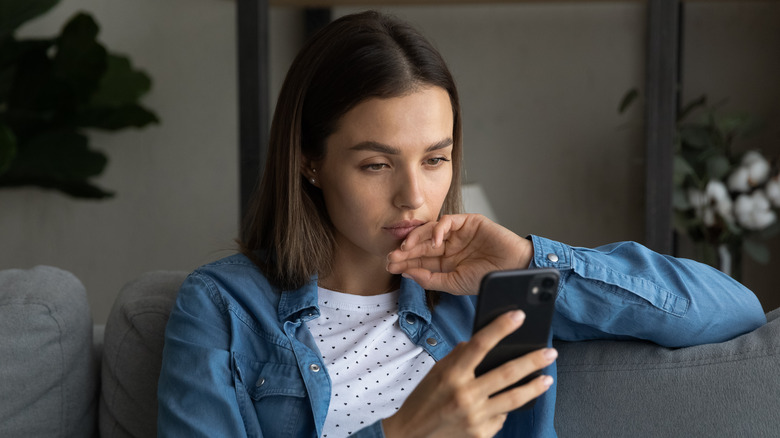
Fizkes/Shutterstock
Since anxiety is often aggravated by fear, it stands to reason that watching the news might accelerate your worries and make you feel worse. That’s especially true if your news consumption is particularly high, and if you get your news from a variety of different sources, like television and social media. Let’s face it: The news is hardly full of fun and heartwarming stories, which means it’s up to you to monitor your intake and determine how it makes you feel.
As Annie Miller, MSW, LCSW-C, LICSW, told Verywell Mind, “It can be damaging to constantly be reading the news because constant exposure to negative information can impact our brain.” She explains that the body reacts to the news a lot like it would to a threat, activating the sympathetic nervous system and a flight-or-fight response that leaves you consistently on edge.
Moderation is the key, just like everything else in life. If you consider yourself a news junkie, gauge just how well you can distance your emotions from the stories you hear. If they’re always on your mind or you’re constantly monitoring the news for updates and it interferes with your ability to focus on other things, it might be time to take a step back. Consider subscribing to an email newsletter that provides a single email featuring the day’s headlines — nothing more. It may help you stay in check.
Drinking way too much caffeine

Fg Trade/Getty Images
That morning cup of coffee is everything. It’s what fuels you for that far-too-early meeting with the team. It gives you the jolt you need to tick everything off your to-do list one by one. It makes life more enjoyable. What could possibly be wrong with that, right?
Unfortunately, there’s quite a bit wrong with consuming caffeine in any form if it has an impact on your mental health. Susan Bowling, PsyD, explains to Health, “The natural effects of caffeine stimulate a host of sensations, such as your heart beating faster, your body heating up, your breathing rate increasing — all things that mimic anxiety.”
Caffeine intake can have such a profound impact on anxiety that the U.S. Food & Drug Administration recommends no more than 400 milligrams, or the equivalent of four or five cups of coffee daily, as safe. If you feel unhappy, miserable, jittery, shaky, or have trouble sleeping, it’s possible that you’ve consumed more than is right for you. While cutting out caffeine entirely can be very challenging, it’s doable, especially if you’re concerned that it’s at least partially responsible for your anxiety. Kick the habit by switching to half-caff before eventually replacing that with straight decaf.
Ignoring anxiety
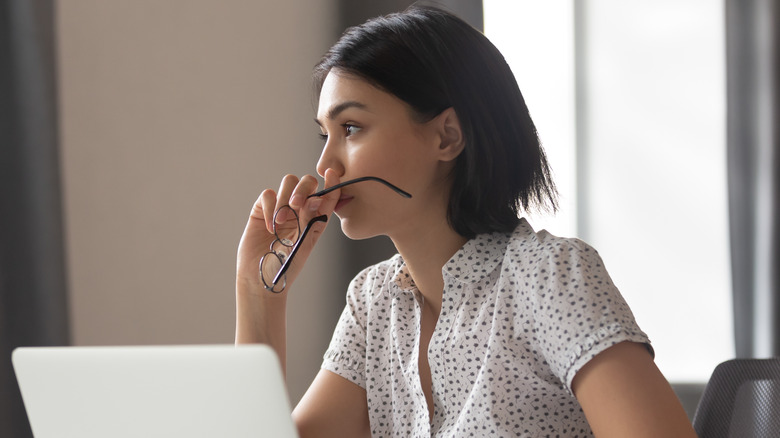
Fizkes/Shutterstock
It’s easy to get caught up in the business of your everyday routine and subsequently neglect your needs. Maybe you’re drowning in work, losing yourself in activities on campus, or trying to fill your plate with as much as possible. While it can be great to stay busy, it can also be detrimental if you’re doing all of that in an effort to drown out the noise that is your anxiety.
Think of your anxiety as a signal that it’s time to pay extra-special attention to yourself. Consider your symptoms first and foremost. Does your heart race? Are you nauseous? Do you have trouble sleeping? Are you always preoccupied with worries of some kind — even things that are completely out of your control? You might have anxiety, and if it’s interfering with your life, you need to do something about it for your own peace of mind and wellbeing.
Ignoring anxiety can lead you down a different and even more difficult path, too. You might experience more physical symptoms, for example, or you may find yourself using unhealthy coping mechanisms like drinking or gambling in an effort to escape from your everyday life. It’s best to talk to someone if you feel anxious, whether that someone is a friend or a family member. The more energy that you put into your mental wellbeing, the happier you’ll be.




